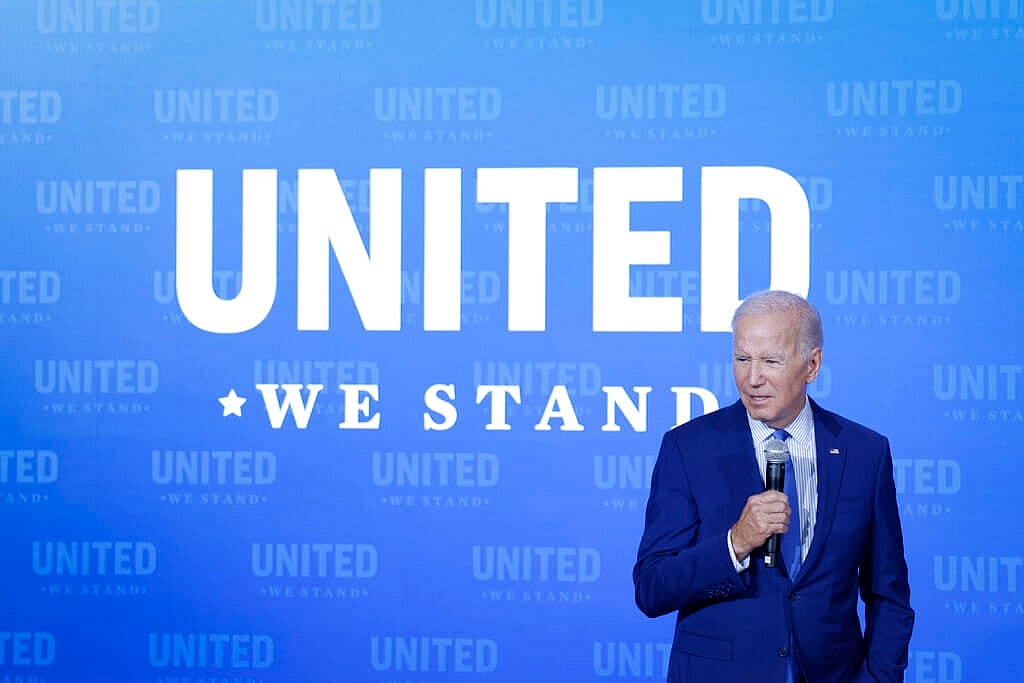Ending hate-fueled crimes was the focus of the Biden-Harris administration’s first day-long White House summit on Thursday. The United We Stand event brought together civil rights, women’s rights and religious leaders, among others, to address what the White House notes as a rise of hate and violence in the United States.

The day of the summit also marked the 59th anniversary of the 16th Street Baptist Church bombing in Birmingham, Alabama, where four Black girls were murdered by members of the Klu Klux Klan.
The United We Stand summit took place inside the packed White House East Room. It was organized in response to the deadly mass shooting of nine African-American shoppers and workers inside a Tops grocery store in Buffalo, New York in May, as well as other hate incidents like an hours-long hostage scare inside of a Texas synagogue in February. Both incidents were committed by alleged white extremist gunmen.
Civil rights leader Al Sharpton and Marc Morial, president of the National Urban League, were two of the leaders behind the push for a White House-level forum for Democrats and Republicans, along with civil rights and faith leaders, to collectively call out and seek policy solutions to the issue of hate-fueled violence and white nationalism.
“We can’t keep fighting only in our particular silo. We need to come together,” said Sharpton on the importance of the White House summit.
During his remarks, President Joe Biden publicly called out social media companies and the need to hold them accountable for “spreading hate and fueled violence” on their platforms. Biden urged Congress to “get rid of special immunity” for the tech companies and “impose much stronger transparency requirements.”

Anti-Defamation League CEO Jonathan Greenblatt told reporters many of the “manifestos” published by gunmen before they committed a number of deadly mass shootings were done on social media platforms. Greenblatt said the tech companies have not “voluntarily” moved to effectively address the issue, emphasizing the importance of President Biden publicly calling them out.
Morial and Sharpton both said they met with Facebook CEO Mark Zuckerberg at his home to encourage him to be more proactive in addressing hate speech and activity on his platforms, which include Instagram and Whatsapp.
In an interview with theGrio, White House Domestic Policy Advisor Susan Rice, who organized the United We Stand summit, noted the reception of the president’s remarks.
She said, “The reason why the president got a standing ovation from the whole audience, including the civil rights leaders, when he talked about accountability and transparency and the need to remove immunity from social media organizations who act like press but don’t have any of the constraints … it’s because these platforms have been used time and again by violent extremists, among others, to recruit, to spread hate and to magnify the impact of their violence.”
From the White House briefing room podium, Press Secretary Karine Jean-Pierre affirmed the president’s support for accountability for social media companies. However, she mentioned that tech companies like YouTube, Twitch, Microsoft and Meta are “announcing new actions their platforms are taking to prevent hate-fueled violence as well.”

Another highlight at the all-day summit, as noted by Rice, included the Department of Justice announcing that in all “94 offices of U.S. attorneys around the country, there is going to be a United Against Hate [initiative] that is designed to ensure that communities are connected to law enforcement, to root out and reduce risk of hate-fueled violence.”
As the White House makes clear its commitment to combat violence inspired by hate in the United States through efforts like Thursday’s summit, Sharpton emphasized that the administration also continues to promote the message that “a vast majority of Americans agree that there is no place for hate-fueled violence in our country, and that when Americans stand united to renew civic bonds and heal divides, we can help prevent acts of hate and violence.”
Sharpton said the Biden-Harris administration also highlighted “the resilience of communities and individuals who are healing from hateful attacks, including mass shootings, and put forward a shared vision for a more united America.” The activist hopes the conference will help lead to tangible results, including policy or laws that allow the Justice Department to crack down on hate groups “before they get to violence.”
Jean-Pierre highlighted additional actions made by the White House and its partners, including the launch of dignity.us, a citizens initiative to “address hate-fueled violence in America, to foster dialog to communities across the country and identify solutions to address hate-fueled violence.”
The presidential spokesperson also noted the newly announced group called New Pluralists, which she described as “a cross-partisan group of philanthropic and field leaders” who are “mobilizing $1 billion in new investments to increase support for programs that build bridges among Americans of different backgrounds to foster unity.”
Jean-Pierre also said that more than 140 mayors have signed the new bipartisan Compact to Combat Hate and Extremism, “committing to stand up against hate, violence, and increase their support of local initiatives and heal divides.”
The press secretary declined to preview any potential legislation the White House may be discussing with Congress, but said the publicly announced deliverables are a “first step” to “addressing hate-fueled violence in communities that we see across the country.”
TheGrio is FREE on your TV via Apple TV, Amazon Fire, Roku and Android TV. Also, please download theGrio mobile apps today!

